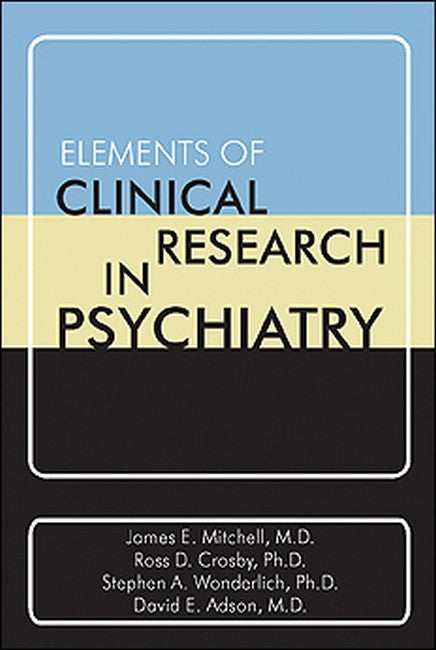Clinical research is often thought of as a dry and somewhat arcane pursuit. Not so, assert the editors of Elements of Clinical Research in Psychiatry. The editors, all actively engaged in clinical research, bring this topic to life by combining a boundless enthusiasm for their chosen field with a depth of knowledge rarely seen in the literature. They show that clinical research can be rewarding not only because the research results contribute to improving the welfare of psychiatric patients, but also because the research process itself is exciting. Arguably the definitive guidebook on clinical psychiatric research, this volume discusses Careers in clinical mental health research -- Describes what clinical psychiatric researchers do and how to get started on this career path. Research design, measurement, and assessment -- Covers all aspects of research design, defines and evaluates measurement types, and details various assessment methods (from interviews and questionnaires to lab tests and brain images). Descriptive and inferential statistics -- Shows how statistics are used to analyze and summarize measurement data. Research support -- Provides a roadmap for those seeking research support in the U.S. (more than 90% is funded via NIH), detailing how to write grants from the ground up. Use of human subjects (the Institutional Review Board [IRB]) and ethics and misconduct -- Demystifies the often intimidating process of seeking and receiving IRB approval, with tips on how to work with the IRB and complete its consent forms; uses a series of practical scenarios, including a highly publicized case of alleged misconduct, to illustrate complex ethics and misconduct issues. Writing journal articles, reviewing manuscripts, and giving scientific presentations -- Presents the nuts and bolts of publishing journal articles; gives step-by-step advice for reviewing manuscripts and giving oral presentations, symposia, poster sessions, and colloquia. Carefully chosen appendixes provide readers with additional information they can use right away, augmented by an index and detailed reference list for further investigation. Anyone considering clinical psychiatric research as a career option will find in this succinct and eminently practical volume the single source they need. Practicing psychiatrists interested in specific areas of clinical research, such as human subject use or biomedical ethics, will also find much of interest here. Replete with useful information, these stimulating discussions provide the building blocks for embarking upon -- and enhancing -- a successful career in clinical psychiatric research.

